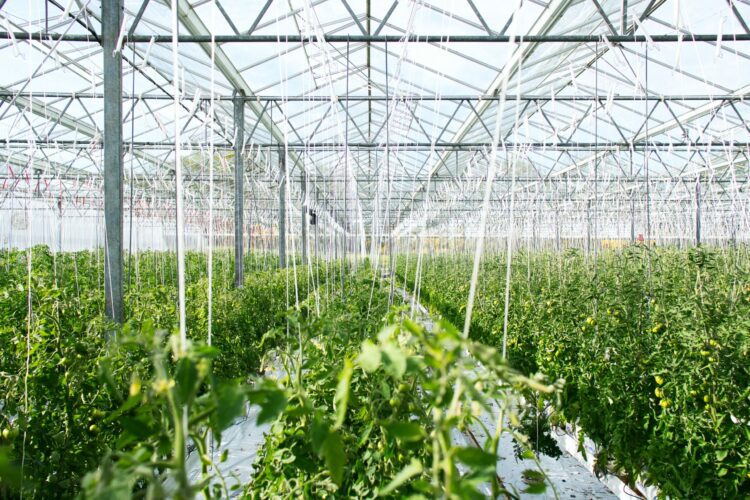The first edition of the International Symposium on Agricultural Transformation and Biotech Crops in Africa (ISATBCA) took place on June 2, 2022, at the West Africa Center for Crop Improvement (WACCI) premises.
Some of the participants at the International Symposium on Agricultural Transformation and Biotech Crops in Africa in Ghana. [WACCI]
Featuring over 100 scientists and 25 speakers, the event’s main objective was to find ways in which agricultural industry stakeholders can enhance farmers’ access to crops produced through new breeding techniques (NBTs).
African governments to create an enabling environment for deploying agricultural biotechnology to address food insecurity.
A communique released after the event recommends a ten-point action plan for governments, stakeholders, and researchers to embrace plant biotechnology, including genetic modification and genome editing, in the fight against food insecurity.
It mentions that collaborative research and discovery are essential to unlock new possibilities.
 Joseph Opoku Gakpo, the Country Lead for Alliance for Science Ghana. [WACCI]
Joseph Opoku Gakpo, the Country Lead for Alliance for Science Ghana. [WACCI]
The communique was signed by WACCI’s founding director Prof Eric Yirenkyi Danquah, and Country Lead for Alliance for Science Ghana, Joseph Opoku Gakpo.
It urges African governments to create an enabling environment for deploying agricultural biotechnology to address food insecurity.
Nigeria, South Africa, Ghana, Ethiopia, Kenya, Malawi, Sudan, and Eswatini, have approved or commercialized genetically modified crops.
Under the theme Pathways to Achieving Food Security in Africa, the communique also encourages governments to demonstrate political support for biotechnology by addressing challenges related to limited human resources and insufficient investments.
Build human capacity
It also recommends allocating sufficient resources to academic institutions that train plant breeders and biotechnologists to build human capacity and provide them with the resources required to create Made-in-Africa biotech crops.
Several African countries, mainly Nigeria, South Africa, Ghana, Ethiopia, Kenya, Malawi, Sudan, and Eswatini, have approved or commercialized genetically modified crops.
 Bio-fortified bananas in National Agricultural Research Laboratories farm in Kawanda, Uganda. [Agnes Nantambi]
Bio-fortified bananas in National Agricultural Research Laboratories farm in Kawanda, Uganda. [Agnes Nantambi]
The communique proposes that stakeholders in agricultural biotechnology focus not only on traits that directly benefit farmers but also on consumer-oriented traits like biofortification, improved taste, and delayed ripening.
It further asks them to foster public-private partnerships to ensure sustainability and adopt efficient business operating models for project implementation.
The science community should educate and inform the public about the benefits of biotech crops.
Research by the Alliance for Science published in 2022 stated that about a fifth of Africa’s media coverage on GMOs contained misinformation.
It describes the finding as worrying since genetic engineering can potentially enhance nutrition and food security in the continent.
Benefits of biotech crops
On misinformation, the communique recommends that all stakeholders address long-term public misinformation and disinformation campaigns and that the science community proactively educates and informs the public about the benefits of biotech crops.
 [File]
[File]
The scarcity of high-quality seeds severely hinders agricultural productivity in Africa, which poses a significant challenge to farmers.
The communique urges governments to establish seed systems that ensure the delivery of biotech seeds to farmers.
Increase investments in biotechnology projects
It adds that traditional plant breeding, agronomy, digitization, and other approaches be recognized as complementary to improving food systems.
It further charges the governments to increase investments in biotechnology projects to address food insecurity and reverse the dependence on donor funding.
State regulators need to address loopholes in regulatory frameworks for genetically modified and genome-edited crops.
Studies indicate that implementing biosafety and food/feed safety regulations is crucial within a larger international framework that impacts the availability and utilization of genetic resources in food and agriculture.
Precautionary regulation regarding GMOs has been a common concern, as demonstrated by the Cartagena Protocol and various national and sub-regional regulatory frameworks.
Harmonizing biosafety frameworks continentwide, with the African Union taking the lead in this effort, is essential.
The communique requests regulators to address loopholes in regulatory frameworks for GMOs and genome-edited crops and streamline and simplify the processes while maintaining transparency and robustness.
Adopt an interdisciplinary approach
It says harmonizing biosafety frameworks continentwide, with the African Union taking the lead in this effort, is essential.
For research and development efforts in deploying biotech, the communique recommends adopting an interdisciplinary approach while considering political, sociocultural, legal, ethical, environmental, and economic factors from pre-deployment to post-deployment.
 Prof. Eric Yirenkyi Danquah. [WACCI]
Prof. Eric Yirenkyi Danquah. [WACCI]
Professor Danquah suggested that the symposium should be held annually.
The aim is to explore innovative tools, technology, and techniques to revolutionize African agriculture.
The planning for the 2024 edition of the ISATBCA has started.
Universities, research institutions, civil society groups, industry actors, and other players within the agricultural space are encouraged to join the organizers in ensuring the event’s success.
___________________________________________________________________________________________
Dennis Baffour-Awuah is a science communication enthusiast who advocates for scientific and agricultural innovations. He is a 2018 fellow of the Alliance for Science Global Fellowship Program. Dennis holds a BSc in Agricultural Biotechnology from the Kwame Nkrumah University of Science and Technology and an MPhil in Nuclear Agriculture from the University of Ghana.
Categories
Source link : https://allianceforscience.org/blog/2023/07/african-countries-urged-to-embrace-new-breeding-techniques-in-the-fight-against-food-insecurity/
Author :
Publish date : 2023-07-25 07:00:00
Copyright for syndicated content belongs to the linked Source.





